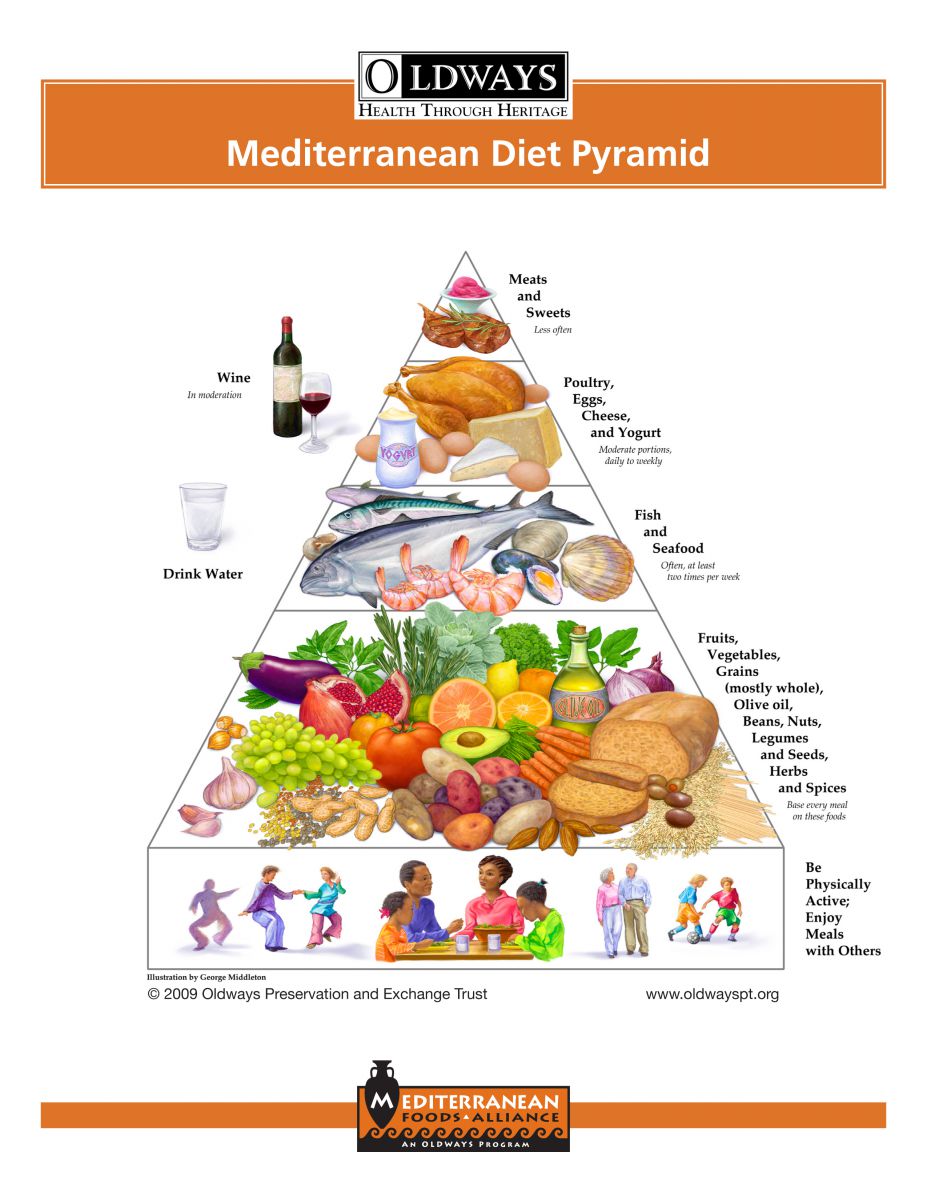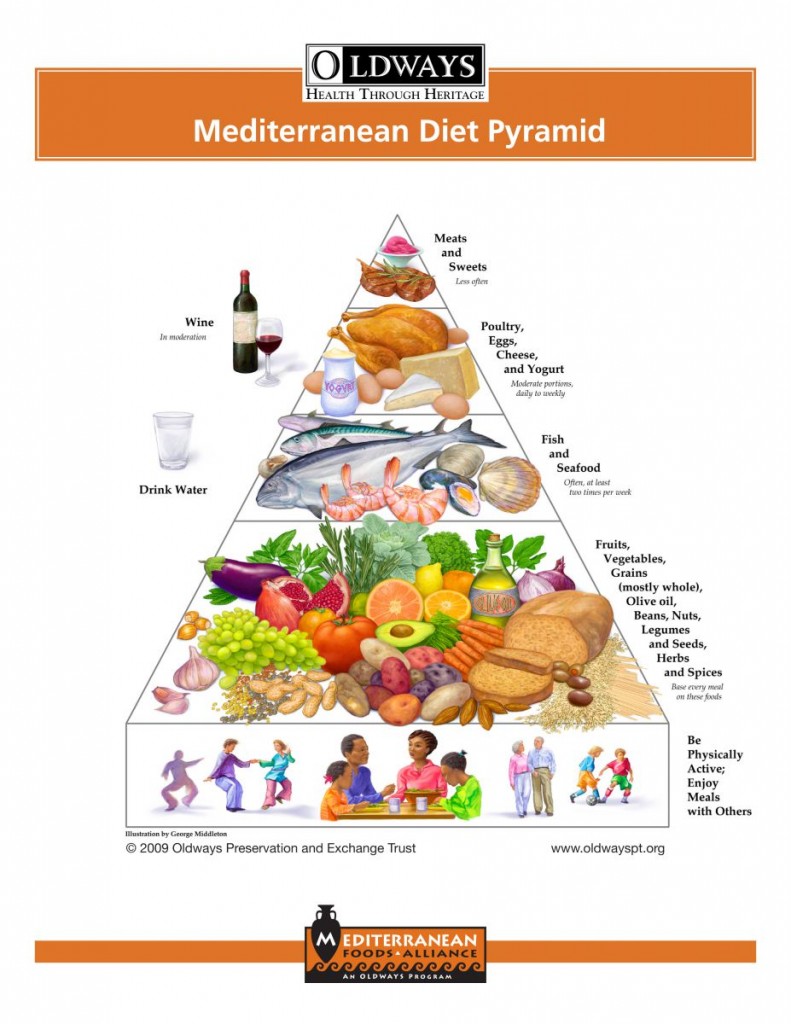You have probably heard of the Mediterranean Diet, a way of eating based on the healthy habits of the people living around the Mediterranean Sea. You may have even tried to adopt bits and pieces of the diet into your own lifestyle such as increasing consumption of seafood or drinking a glass of wine with meals. But do you know how to get the full benefits of the Mediterranean Diet? Check out the following Q & A session I recently had with Georgia Orcutt, Program Manager for Oldways and the Mediterranean Foods Alliance.
Why adopt a Mediterranean-style diet?
Why not?! There are so many great reasons to follow this eating pattern, which the latest Dietary Guidelines validate and many doctors and health professionals endorse. It can help you lose or maintain weight, lower your risk of heart disease and high blood pressure, fight certain cancers and chronic diseases, even boost brain health. Everything you need is as close as your nearest supermarket, the foods are inexpensive, and the meals are delicious!
What are some practical tips on getting started?
Taking small steps, one a day or one a week, can be the best way to make positive, healthy changes in the way you eat. Because we are all such creatures of habit, it can be very difficult to understand and consistently follow through on portion control and creating a Mediterranean-style lunch or dinner plate that looks different than what we are accustomed to seeing. (i.e. a variety of vegetables, smaller amounts of meat, 1/2 cup of pasta or rice). It’s important to keep meals simple and easy, aim for making every meal taste great, and to eat nourishing foods that promote satiety. We outline these 8 simple steps to help people learn how to adopt the Mediterranean eating pattern: Eat lots of vegetables; Change the way you think about meat and if you eat it, add small amounts to vegetable sautes or use as a garnish for a dish of pasta; always eat breakfast; eat seafood twice a week; cook a vegetarian meal one night a week, and then aim for two nights a week; use healthy fats in daily meals, especially extra-virgin olive oil, nuts, peanuts, seeds, olives and avocados. In addition, we encourage consumers to discover the wide variety of delicious Mediterranean foods at the supermarket and learn how to routinely break old habits and make healthy substitutions. For example, buy Greek yogurt and use that instead of sour cream; sample different varieties of hummus, find your favorites, and use that in place of mayonnaise.
What lifestyle changes are necessary to fully adopt a Mediterranean Diet?
The Mediterranean Diet is a “whole diet” in that it isn’t just about eating certain foods. It is about your whole health, your values, your habits, your relationship with food. It promotes a way of life that includes regular physical exercise (gardening, dancing, sports, house work, and child care all count!), consuming a variety of foods in moderation, enjoying meals as part of the family and social fabric, and allowing time spent eating to be relaxing, nourishing, and enjoyable.
For more information on the Mediterranean Diet, visit the Oldways website.



I guess I never really knew I was eating "mediteranearn" I just aim for more fruits and veggies than meat or anything else. I do like mediteranean things though!
One thing I struggle with is the seafood thing. I have yet to find a fish that everyone (including me) will eat. Other than shrimp and to me that doesn't count because it is so high in fat…
I'd love to see a post on how to prepare a less "fishy" fish and how to get you kids (or me 🙂 to eat it!
I guess I never really knew I was eating "mediteranearn" I just aim for more fruits and veggies than meat or anything else. I do like mediteranean things though!
One thing I struggle with is the seafood thing. I have yet to find a fish that everyone (including me) will eat. Other than shrimp and to me that doesn't count because it is so high in fat…
I'd love to see a post on how to prepare a less "fishy" fish and how to get you kids (or me 🙂 to eat it!
I hadn't heard of this. But I love it. =) I'm a big fan of healthy eating habits, not just food. Sharing meals with other people is one of the best things in life.
PS: I voted for your blog. 😉
I remember hearing about the Mediterranean Diet in college during my Nutrition courses! It's the best way to eat I believe. Goes right along with CHO 55-60%, Protein 15-20% and Fat >30%.
I found your blog through Top Mommy Blogs and think we have a lot in common! Just started my blog @ http://www.csperriton.blogspot.com. I have a giveaway going on right now. I'll follow you if you follow me! 😉
Many aspects of this eating pattern are appealing, and I especially love the focus on family meals, active lifestyles and many nutrient-rich foods.
The recent Dietary Guidelines reported that Americans are not getting enough fiber, potassium, calcium and vitamin D in our diets. The Mediterranean diet is high in fiber due to the focus on whole grains, fruits and vegetables. They also get adequate amounts of vitamin D as their cultures have very temperate climates and a lifestyle which includes much more time outside. But people here in the US need to make sure they keep fluid milk in their diet to keep vitamin D levels adequate. Also, including milk and milk products within the Mediterranean eating plan ensures we get enough of the identified "shortfall" nutrients like potassium, calcium and vitamin D.